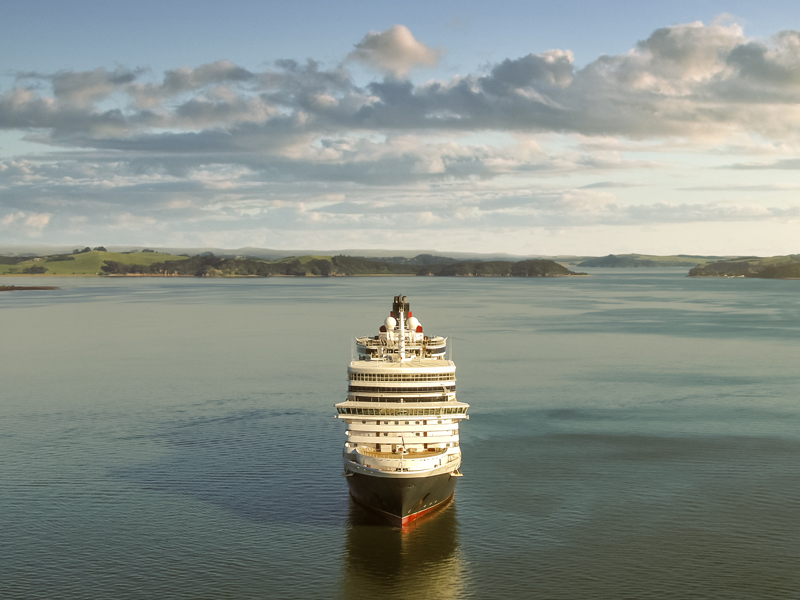Thousands of Australians followed the Cruise Passenger story of Stan Hoey, a British passenger whose Cunard itinerary suffered cruise cancellations at a range of New Zealand ports.
He won compensation in a UK court for the missed ports. The reader reaction showed that Hoey wasn’t alone in suffering from curse cancellations.
Now a Sydney lawyer specialising in maritime cases has maintained that the issue could mean that Australians would also be able to claim for compensation, based on an Australian finding.
Hoey sailed in January on a cruise to New Zealand with Cunard, and was distraught to find out his cruise would be missing a significant portion of its promised ports. He was able to win compensation in court due to an email he came across that proved Cunard knew beforehand they would be have to cancel the ports in question, but failed to notify customers.
Essentially, the issue being adjudicated was that if a travel company knows prior to a trip commencing, that they will not be able to deliver the promised itinerary, and fail to inform their customers, are the customers be entitled to compensation? The court ruled that yes, they are.
Cruise lawyer says Aussie’s could seek compensation as well
Victoria Roy, the principal solicitor at Victory Travel & Cruise Lawyers, says there is strong precedent to suggest the case would have the same outcome in Australian courts.
This precedent comes from a recent case where cruise and travel company Scenic, had to cancel almost all of a river cruise and offer a coach-based tour instead. The company was taken to court with passengers arguing that Scenic knew in advance this would happen, but failed to notify the passengers and let them rearrange their travel.
Scenic were found to have breached Australian Consumer Law and had to compensate passengers.
Roy says: “Cruise lines’ terms and conditions usually stipulate that itineraries aren’t guaranteed.
“However Australian courts found in the Moore v Scenic Tours class action – where Scenic essentially gave passengers a coach tour instead of a river cruise because of bad weather – that when a cruise line knows that external circumstances will have a significant impact on the cruise but fails to notify passengers in advance, this is a breach of the Australian Consumer Law.
“Those passengers successfully won damages for the ACL breaches plus additional compensation for their disappointment over the ruined cruise. There is therefore a favourable precedent if Australian passengers launched their own case.”
Hoey mentioned that he was aware the same thing happened with Cunard a month later in February 2023, and two Cruise Passenger readers were actually on that cruise.
Phil Bourke wrote to Cruise Passenger: “My wife and I were booked on a similar cruise from Melbourne around NZ but a month later than Mr Hoey – the February cruise the report mentions. We booked direct with Cunard and met many disaffected passengers who had travelled from the UK and had only been told of the changed itinerary (Feb cruise!) when they arrived in Melbourne.
“We were also given the “hull scraping to be done” excuse before being told that our cruise would only go along the east coast of Australia – from Melbourne to Cairns – a poor substitute for NZ cruising.
“Interestingly, outside one of the ships lounge areas, a cruise map is signed off by the captain and senior crew. It was dated a couple of days before our sailing from Melbourne and only showed the route to Cairns and back. Also the QE was due for a drydock in the following months in Singapore and a sceptic might argue that Cunard and its owners did not want to spend any extra to clean the hull so soon before the drydock refurbishment.
“Whilst Cunard did give us a similar cruise credit, it appears they have been somewhat duplicitous in their changes to these itineraries.”
Essentially, the comments from Roy appear to signify that cruise passenger’s such as Phil Bourke and his wife have legal grounds to seek compensation as well.
The key factor
The key factor in both Hoey’s case and the Scenic case mentioned above, is that the cruise companies knew that they wouldn’t be able to deliver the promised itinerary before the cruise started, but did not inform passengers of this.
What was found to be a breach of Australian Consumer Law was the failure to notify passengers despite the company being aware of extenuating factors that would affect the cruise.
This means common situations such as when Australians cruise to the South Pacific or tropical Queensland and have to skip ports last minute due to weather, would not be covered under the precedent.
However, the revelation that situations where the cruise lines were aware of not being able to meet the itinerary but failed to notify passengers, can create liability for the cruise lines, could be a significant moment in the development of Australian Consumer Law for cruise.









Apparently Princess, Holland America amd Cunard all come under the Carnival umbrella. Five of the eight weeks of our Princess Cruise earlier this year was diverted, to avoid the Red Sea. Obviously the itinerary had to change but we were not allowed a refund, we had to spend most of the first five weeks at sea and had to listen to passengers who bought tickets post route change for a fraction of the price we paid. Compensation offered was pathetic. We are Australians and bought our ticket via a US travel agent so not sure what our legal options for satisfactory compensation would have been.
We also had to cancel a cruise organised by Imagine travel and despite lots of communication they refused any support of our claim. Have you had problems with Imagine
My husband and Insere also on that Cunard cruise to New Zealand and very disappointed at the port cancellations.
We would like to join in any event to support our loss.
Thankyou
We we’re on the later cruise in Feb 14th with 3 hour
Notice no support help or offer of compensation
From imagine cruising and Cunard
No rep from imagine or Cunard
And have been offered ridiculous compensation
Our holiday of a life time gone and life savings
We have FOI evidence from New Zealand
That Cunard knew in Jan they were not going back to New Zealand